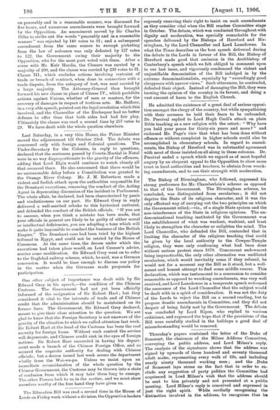Last Saturday, in a very thin House, the Prime Minister
moved the adjournment till October 23rd. The debate was concerned only with foreign and Colonial questions. The Under-Secretary for the Colonies, in reply to questions, declared that the sentences passed by Courts-Martial in Natal were in no way disproportionate to the gravity of the offences, adding that Lord Elgin would continue to watch closely all that occurred there. He also announced that there would be no unreasonable delay before a Constitution was granted to the Orange River Colony. Mr. J. M. Robertson made a violent and foolish attack upon the authorities responsible for the Denshawi executions, censuring the conduct of the Acting Agent in deprecating discussion of the incident in Parliament. The whole affair, he declared, had been characterised by panic and vindictiveness on our part. Sir Edward Grey in reply delivered a well-merited rebuke to this hysterical outburst, and defended the conduct of the British officials. "if you are to assume, when you think a mistake has been made, that your officials in general are likely to be guilty of either moral or intellectual deficiencies, you are adopting a tone which will make it quite impossible to conduct the business of the British Empire." The Denshawi case bad been tried by the highest tribunal in Egypt, and could not be retried by the House of Commons. At the same time, the decree under which the executions had taken place would, on Lord Cromer's advice, receive some modification. Sir Edward Grey went on to refer to the Baghdad railway scheme, which, he said, was a German concession. It would be time enough to discuss our policy in the matter when the Germans made proposals for participation.


































 Previous page
Previous page